The views expressed in our content reflect individual perspectives and do not represent the authoritative views of the Baha'i Faith.
Even though you hear the drums of war beating, you probably have no desire to dance to that tune. You’re a peace-loving person, and yet you see war on the horizon — so what can you do?
In most countries today, war comes about, not by general agreement of the entire population, but instead by the decisions of a few people in power. Those people, whether elected or not, either make threats or react to threats from others; then tension rises; and finally the shooting and the bombing starts.
That whole process makes the average person feel completely powerless. We don’t want war — most sensible people never do – but we think we have no perceived power to stop it.
Sure, we can join antiwar marches, take part in peace groups and cast our votes for politicians who don’t want to wage war, but these things may seem pretty ineffective in the face of war’s juggernaut. Those who work for peace in these ways deserve praise, certainly, but very few popular movements have ever stopped the war machine from moving forward into death, destruction and catastrophe.
The Baha’i teachings offer an alternative approach, which combines both the practical and the idealistic, the material and the spiritual.
Baha’u’llah asked the entire human race to commit to establishing our collective responsibility for peace. In world affairs, Baha’is believe that no nation can dominate, dictate to or deprecate any other nation. Instead, the Baha’i teachings say that every country on Earth must ultimately recognize its organic interdependence with all other countries, and unite in a federated system of global governance to preserve the peace and stability of the entire planet:
It is binding and incumbent upon the peoples of the world, one and all, to extend aid unto this momentous Cause which is come from the heaven of the Will of the ever-abiding God, that perchance the fire of animosity which blazeth in the hearts of some of the peoples of the earth may, through the living waters of divine wisdom and by virtue of heavenly counsels and exhortations, be quenched, and the light of unity and concord may shine forth and shed its radiance upon the world.
We cherish the hope that through the earnest endeavours of such as are the exponents of the power of God – exalted be His glory – the weapons of war throughout the world may be converted into instruments of reconstruction and that strife and conflict may be removed from the midst of men. – Baha’u’llah, Tablets of Baha’u’llah
Instead of disjointed, ineffective but well-meaning individual and group efforts in various places to try to stop war, the Baha’i teachings invite humanity to support, aid, and join a universal, global Cause specifically revealed and designed by Baha’u’llah to create an abiding consciousness of world citizenship and thereby counter the forces of war:
Unbridled nationalism, as distinguished from a sane and legitimate patriotism, must give way to a wider loyalty, to the love of humanity as a whole. Baha’u’llah’s statement is: “The earth is but one country, and mankind its citizens.” The concept of world citizenship is a direct result of the contraction of the world into a single neighbourhood through scientific advances and of the indisputable interdependence of nations. Love of all the world’s peoples does not exclude love of one’s country. The advantage of the part in a world society is best served by promoting the advantage of the whole. – The Universal House of Justice, The Promise of World Peace
As long as the current uncoordinated system of a few hundred independent countries exists, it will inevitably generate conflict and contention. This “unbridled nationalism,” the Baha’i teachings say, can only relinquish its grip on humanity when and if we unite.
To sum it up, the Baha’i teachings point out that despite all these wars and rumors of wars, humanity still has a choice – the most critical and momentous decision we have ever encountered.
Humanity certainly has enough historical evidence to make that choice. Today we have the advantage of fully understanding and comprehending what modern warfare really does, since we’ve seen the unprecedented death and destruction caused by two world wars during the last century. We definitely know the horrific ramifications of a narrow and brutal nationalism, which has always generated warfare by its very nature. By now we can sufficiently comprehend the consequences of allowing dictators, tyrants and despots free reign to do what they wish, declaring war and forcing their subjects to fight and kill one another. At this point, we seem to have all the proof necessary to determine that the world urgently requires unity, and that nothing short of a universal spiritual power can bring it about:
In the erection of a house it is first necessary to know the ground, and design the house suitable for it; second, to obtain the means or funds necessary for the construction; third, actually to build it. Therefore, a power is needed to carry out and execute what is known and admitted to be the remedy for human conditions – namely, the unification of mankind. Furthermore, it is evident that this cannot be realized through material process and means. The accomplishment of this unification cannot be through racial power, for races are different and diverse in tendencies. It cannot be through patriotic power, for nationalities are unlike. Nor can it be effected through political power since the policies of governments and nations are various. That is to say, any effort toward unification through these material means would benefit one and injure another because of unequal and individual interests. Some may believe this great remedy can be found in dogmatic insistence upon imitations and interpretations. This would likewise be without foundation and result. Therefore, it is evident that no means but an ideal means, a spiritual power, divine bestowals and the breaths of the Holy Spirit will heal this world sickness of war, dissension and discord. Nothing else is possible; nothing can be conceived of. But through spiritual means and the divine power it is possible and practicable. – Abdu’l-Baha, The Promulgation of Universal Peace
The Baha’is of the world encourage everyone to join in the quest to unite humanity and bring an end to war.


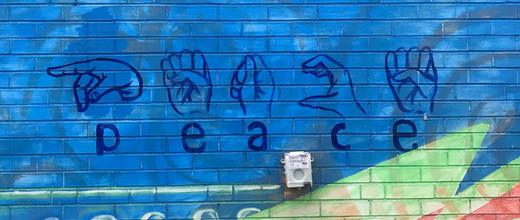


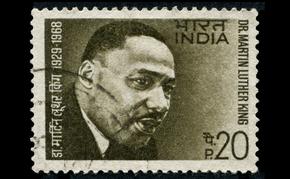


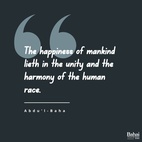
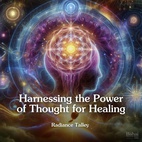
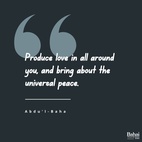
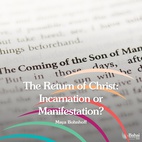
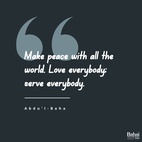




Comments
Sign in or create an account
Continue with Facebookor